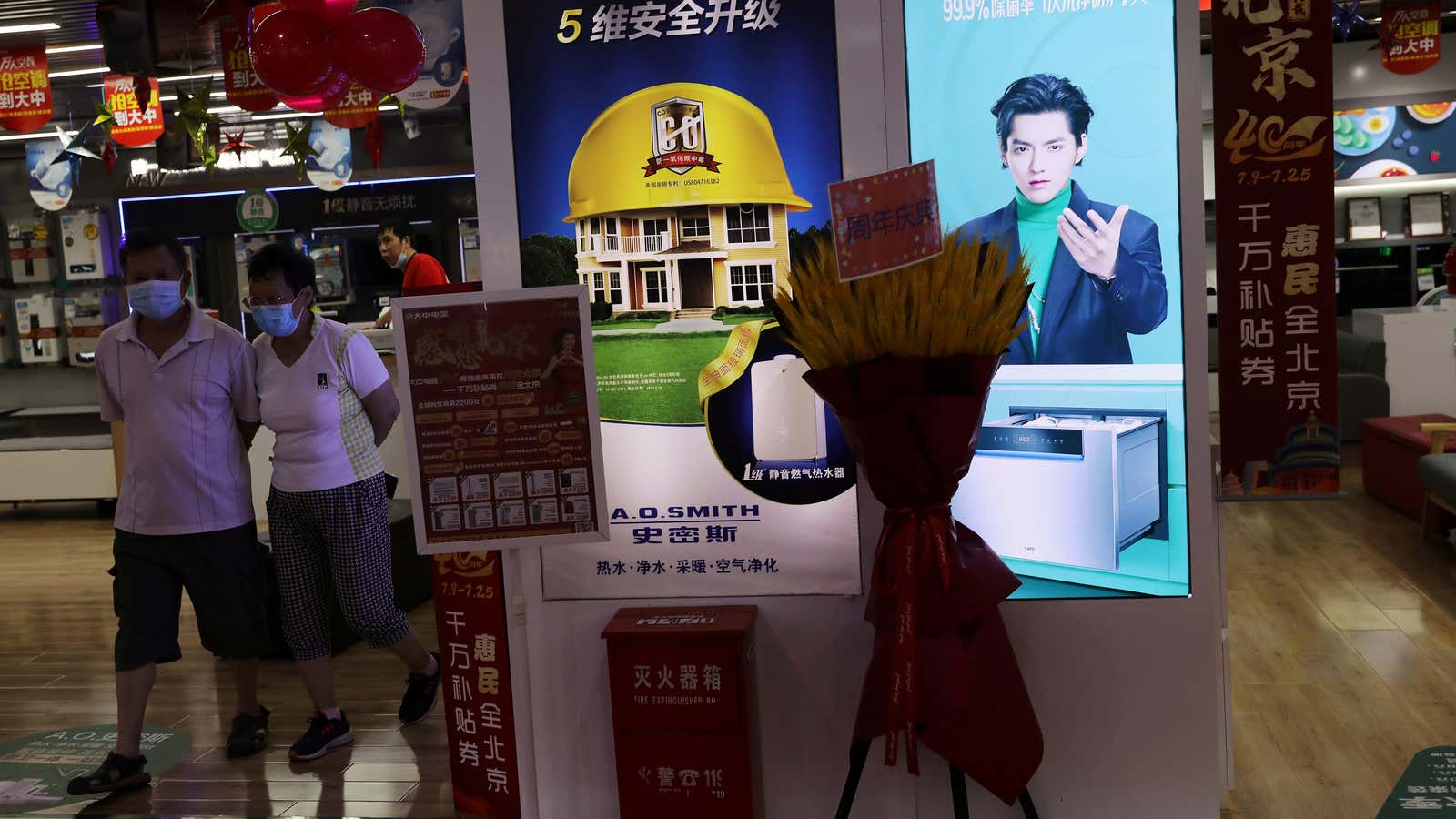Canadian-Chinese pop star Kris Wu is being erased rapidly on Chinese internet platforms after he was detained by police on suspicion of rape.
Wu, whose Chinese name is Wu Yifan, rose to fame after he joined the popular South Korean boy band EXO, and then became a singer and actor in China. He is one of China’s most famous stars with a following of over 50 million on Weibo, and was once the face of major luxury brands. But he’s fallen from grace, under a cloud of serious sexual allegations.
What are the allegations against Kris Wu?
Last month, a young woman accused the 30 year old of enticing girls by dangling opportunities in the entertainment industry and pressuring them into having sex with him. Du Meizhu, an 18-year-old Chinese woman, said she was sent to Wu’s flat by his agent, who allegedly told her it was a job interview. Instead, she says she was pushed to drink excessively and eventually woke up in Wu’s bed.
Du told Chinese media Wu had other victims, including two minors. Following Du’s claims, a former member of popular Chinese girl band SNH48 also revealed her chat records with Wu, who praised her for being “well-behaved” and said he liked girls who are “clean.” The public backlash against Wu over the allegations has led to several brands, including Louis Vuitton and Bulgari, terminating their contracts with him.
Wu and his agency have denied all the allegations.
China’ #MeToo movement
The Chinese police initially accused Du on July 22 of making allegations against Wu to gain “internet fame.” The police confirmed that Du had had sex with Wu, but didn’t say whether it was consensual. But on Saturday (July 31), the police unexpectedly said they had arrested Wu on suspicion of rape.
Wu is the most powerful figure to have been brought down by sexual offense allegations in China, where it remains difficult to bring such cases to court.
His arrest quickly unleashed another social media storm in China, with praise for the police, and comments about it being a major breakthrough in China’s #MeToo movement, which has stalled in recent years.
“The arrest of Wu is a small victory of the #MeToo movement in China, because previously so many similar cases could not even make it to the official investigation period,” said Xiong Jing, a prominent Chinese feminist activist. Many Chinese women, especially those whose allegations could not be handled by the authorities, can draw encouragement from cases like this, she told Quartz.
Wu’s online presence erased overnight
Only a day after the police announced their arrest of Wu, his songs, social media accounts, and fan forums were either taken down or blocked by major Chinese platforms including Weibo, Baidu, Douban, Douyin (Chinese TikTok), Tencent’s QQ Music, and several other music streaming services.
Most platforms have cited “relevant regulations and laws” or violations of its community rules in blocking or removing Wu’ content, but the firms didn’t explain what specific rules they are referring to. Even the Weibo accounts of three female celebrities who defended Wu back in 2016, when a woman accused him of treated her coldly, were either removed or banned from posting.
“It is hard to figure out whether [the removal of Wu’s presence] is the Chinese Cyberspace Administration’s call, in a nod to the public sentiment, or an action taken by Weibo itself,” says Fang Kecheng, an assistant professor of journalism at the Chinese University of Hong Kong.
“I tend to believe that at least in the case of the three celebrities whose accounts were suspended for voicing support for Wu, the termination seems more like an order from the authorities,” he adds, “Because otherwise, Weibo didn’t have to waste the traffic that could have been generated by the three.”
More scrutiny from Beijing on the entertainment industry
The quick removal of Wu’s online presence, meanwhile, shows that companies are increasingly wary of being on the wrong side of public opinion. The luxury brands dropped Wu as their ambassador even before he was arrested by the police, because of tens of thousands of angry comments on Weibo.
Wu’s erasure by these platforms following the arrest announcement signals how significant a role Beijing has played in guiding the actions of those companies, say observers. Previously, dissidents were the ones most likely to be erased from the internet.
His arrest is also seen by many as a sign of Beijing’s determination to extend its regulatory storms to the entertainment industry, where celebrities’ staggering paychecks increasingly infuriate people who believe society is becoming more unequal. Already, Beijing has initiated a crackdown on tutoring schools, in addition to the tech industry, partly because the authorities would like to bridge the inequity caused by the varying quality of educational resources across the country.
In an article published yesterday, China’s state-owned Xinhua news agency said Wu’s arrest has “once again rings the alarm bell for the entertainment industry.”
“Some public figures have caused extremely bad social impact for some of their behaviors,” it said. “The twisted dynamics in China’s entertainment industry need to be thoroughly rectified.”
